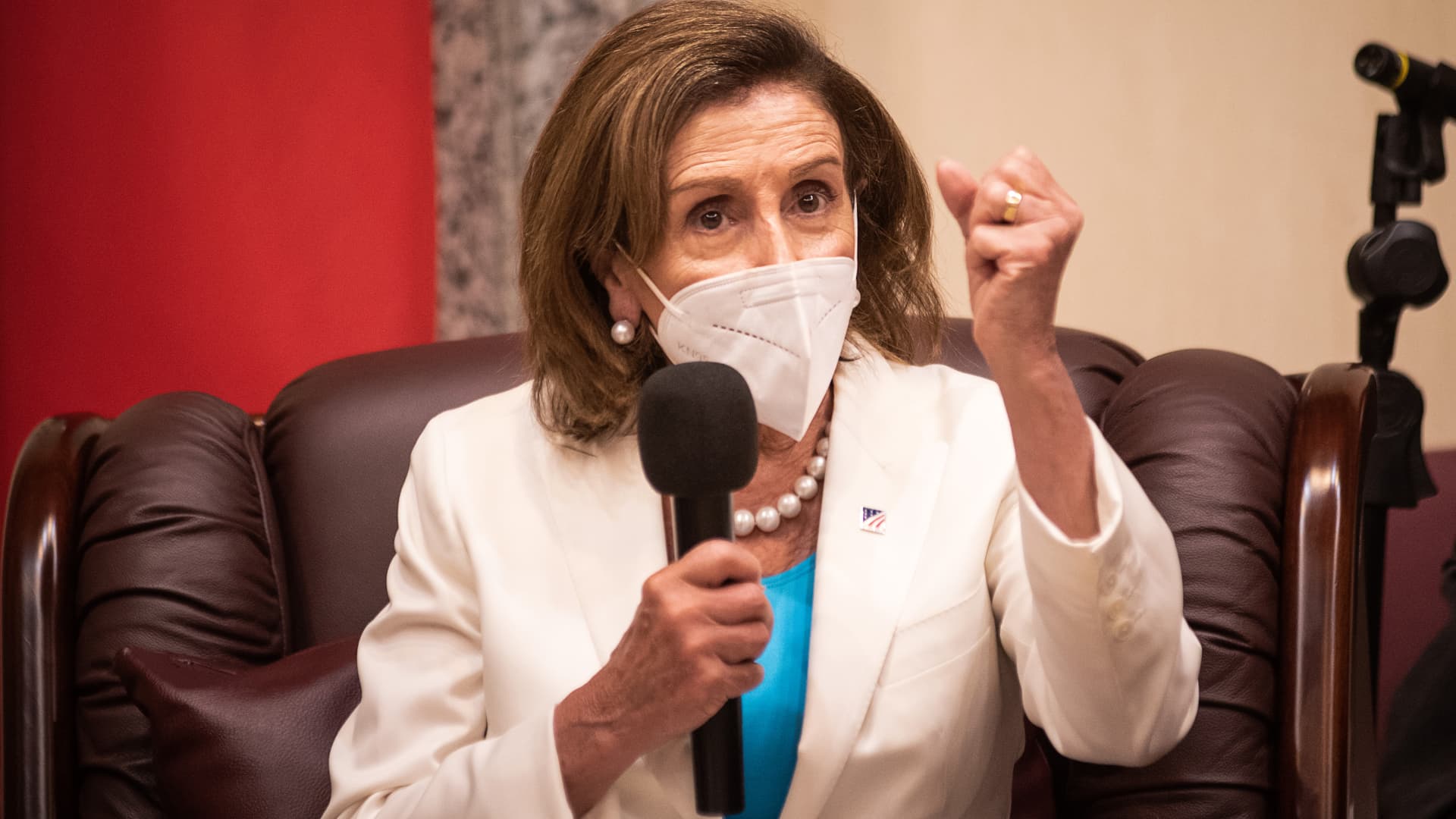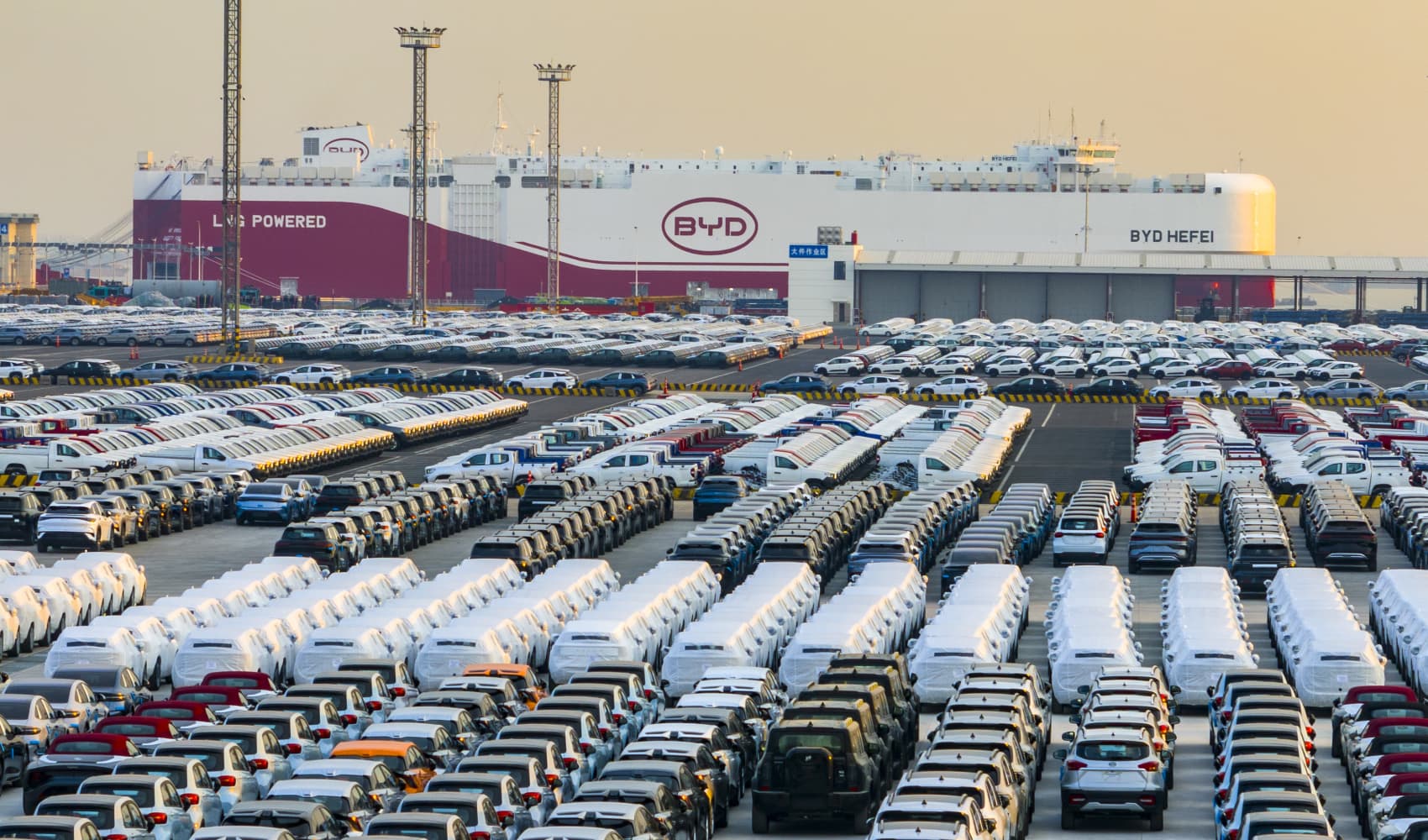
- Pelosi's visit to Taiwan makes her the highest-ranking U.S. official to visit Taiwan in 25 years, drawing the ire of China which has called the move a breach of the one-China policy and an interference in China's internal affairs.
- Tsai said she was committed to working with the U.S. over security in the Taiwan straits and the wider Indo-Pacific region and vowed to deepen economic cooperation and supply chain resilience with the U.S.
- Tsai thanked U.S. House speaker Nancy Pelosi for her support of democratic values.
U.S. House Speaker Nancy Pelosi met Taiwan President Tsai Ing-wen on Wednesday in a high-stakes visit that has infuriated Beijing.
In a meeting in Taipei, Tsai thanked Pelosi for her support of democratic values and said she was committed to working with the U.S. over security in the Taiwan straits and the wider Indo-Pacific region.
Pelosi's visit to Taiwan makes her the highest-ranking U.S. official to visit Taiwan in 25 years, drawing the ire of China which has called the move a breach of the one-China policy and an interference in China's internal affairs.
China has warned for weeks that Pelosi should not visit the disputed island, which Beijing considers to be part of its territory.
"Speaker Pelosi is truly one of Taiwan's most devoted friends," Tsai said at ceremony to confer Pelosi with a medal, the "Order of Propitious Clouds with special Grand Cordon."
Money Report
"We are truly grateful to you for making this visit to Taiwan to showcase the U.S. Congress's staunch support for Taiwan."
Tsai also vowed to deepen economic cooperation and supply chain resilience with the U.S.
Get a weekly recap of the latest San Francisco Bay Area housing news. Sign up for NBC Bay Area’s Housing Deconstructed newsletter.

On her part, Pelosi said she was dedicated to supporting global peace and further economic collaboration with Taiwan.
"The story of Taiwan is an inspiration to freedom loving people in the U.S. and around the world," Pelosi said.
"Out of the crucible of challenge you have forged a flourishing democracy, one of the freest in the world proudly led by a woman president."
Pelosi said further during a press conference after meeting Tsai that it was important to publicize the success of Taiwan as an emblem of democracy and a model for the region. She added Taiwan was a contrast to the political system on mainland China and Hong Kong where the "one country two systems" promise "didn't happen."
The medal that Pelosi received from Taiwan is normally awarded to Taiwanese citizens for services to society but may also be awarded to "foreigners to promote diplomatic relationship," according to Taiwanese law.
Pelosi landed in Taiwan on Tuesday night after leaving Malaysia, and was expected to leave on Wednesday evening.
Political experts have weighed in on the visit saying it was problematic and a mistake.
"Conflict is escalating and it is escalating at a rapid rate. China will not take any reckless steps ... [but] this type of confrontation could be spark a most unfortunate accident," Yale University senior fellow Stephen Roach told CNBC's "Street Signs Asia" on Wednesday.
Former U.S. Ambassador to China Max Baucus also said in a separate interview that Pelosi's visit to Taiwan was a mistake.
"Speaker Pelosi's visit to Taiwan increases tensions, and unnecessarily," he said.
"I think it's dangerous. I think it's reckless."
China's warnings
In the lead-up to the visit, the Chinese military held live-firing exercises all day Saturday, just 80 miles from Taiwan.
Beijing has also moved to ban imports of various goods from Taiwan including Taiwanese sweets and biscuits.
It has also suspended imports of grapefruit, lemon, orange and some other citrus fruits, frozen horse mackerel from Taiwan and exports of natural sand from Wednesday.
Ahead of Pelosi's visit, Hua Chunying, China's assistant minister of foreign affairs, said in a string of tweets Tuesday that Pelosi's visit to Taiwan was a "major political provocation."
"Since Speaker Pelosi is the incumbent leader of the U.S. Congress, her visit to and activities in Taiwan, in whatever form and for whatever reason, is a major political provocation to upgrade U.S. official exchanges with Taiwan," Hua said in her tweets.
While China's military response to Pelosi's visit has raised near-term odds of a major Taiwan Strait security crisis from 25% to 30%, the chance of a major conflict remained low, said Neil Thomas, political analyst at the Eurasia Group in a note before the visit.
'Conflict remains very low'
Eurasia Group expects Beijing's reaction to be "unprecedented but not unhinged," the note on Tuesday said.
"However, these PLA exercises are more performative signals than preparations for war; crisis is not yet basecase and the chance of kinetic conflict remains very low," Eurasia Group senior analyst Neil Thomas said, referring to China's military, the People's Liberation Army.
"The PLA did not interfere with Pelosi's flight to Taiwan and says its planned exercises are meant as a 'serious deterrent' to the US and a 'serious warning' to Taiwan," Thomas said
On Tuesday, during the Chinese ministry of foreign affairs daily press conference, Hua added that China would be closely following Pelosi's itinerary.
"And if the US continues down the wrong path, we will take strong and resolute measures to protect our sovereignty and security interests," Hua said.
Officially, the Biden administration was careful in recent weeks to avoid directly saying whether the president agreed with Pelosi's decision to visit Taiwan. But unofficially, the White House and the Pentagon made little secret of their opposition to it.
Biden's approach to China is one that seeks to maintain a stable, predictable relationship with the U.S.'s biggest trading partner, while also acknowledging that Washington and Beijing are strategic adversaries.
This mindfulness from Biden could also mitigate any possible conflict, Thomas added, but warned the potential for crisis would not abate quickly.
"China could unveil further responses in the coming days, weeks, and even months as the 20th Party Congress approaches in either October or November," the Eurasia analyst said.
"Several of Beijing's major institutions have released unusual statements condemning Pelosi's visit and vowing to defend China's claim to Taiwan."
"Future expressions of support for Taiwan by US and allied officials — including visits, dialogues, and defense cooperation — are now likely to meet harsher responses," he warned.






